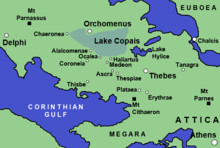- Graea
-
Not to be confused with Graeae.
 Map of ancient Boeotia,indicating the city Tanagra,which could be the place of Graia
Map of ancient Boeotia,indicating the city Tanagra,which could be the place of Graia
Graea or Graia (Greek: Γραῖα) is a region,or a city of ancient Greece that is placed under Boeotia in Homer's Catalogue of Ships; it seems to have included the city of Oropos, though by the fifth century BC it was probably a kome (district) of that city.[1] It is also described by some sources as a city; Fossey argues for its identification with the hill of Dhrámesi 8 km from Tanagra,[2] while others suggest it is identical with Oropos itself.[3] It may have been the source of the word "Greek"; Robin Lane Fox writes:
If men from Oropos-Graia were among the early Greek visitors to Capua or Veii and even early Rome, we can better understand an age-old puzzle: why Greeks were called "Greeks" in the Latin West. Such people told their first contacts in the Latin region that they were "Graikoi," that is, people from Graia. They were thus called "Graeci" by the people whom they met.[4]
There are various etymologies of the name.The most common is the connection with the adjective graia "old woman", derived from the PIE root *gere, "to grow old ", Proto Greek *grau-j, and later geras, keras, "gift of honour" in Mycenean Greek. [5] Another possibility is the relation with a word for "gray". Graikos may be interpreted "inhabitant of Graia. [6]
References
- ^ G. S. Kirk, The Iliad: A Commentary: Volume 1, Books 1-4. Cambridge University Press, 1985, ISBN 0521281717, p. 191.
- ^ John M. Fossey, "The Identification of Graia," Euphrosyne 4 (1970), pp. 3-22.
- ^ Simon Hornblower and Elaine Matthews, Greek Personal Names: Their Value as Evidence. Oxford University Press, 2000, ISBN 0197262163, p. 95; similarly Maria Stamatopoulou and Marina Yeroulanou, Excavating Classical Culture: Recent Archaeological Discoveries in Greece. Archaeopress, 2002, ISBN 1841714119, p. 151.
- ^ Robin Lane Fox, Travelling Heroes: In the Epic Age of Homer. Random House, 2009: ISBN 0679444319, p. 61; see also John Nicolas Coldstream, Geometric Greece: 900-700 BC. Routledge, 2003, ISBN 0415298997, p. 403 (note 7).
- ^ Beekes. Greek Etymological Dictionary. Entry 1531
- ^ Online Etymology Dictionary.
See also
- Boeotia
- Graiki
- Names of the Greeks
- Ogyges
- Minyans
Categories:- Geography of ancient Boeotia
Wikimedia Foundation. 2010.
